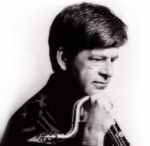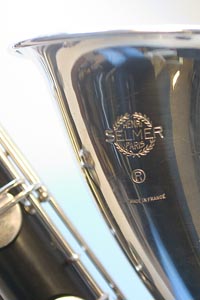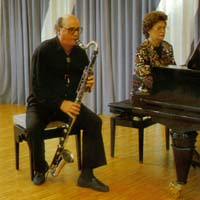
Hot News October 2005
27 October 2005
Rocco Parisi Master Class Week at Grand Valley State University, USA
During October 17-23, 2005, Rocco Parisi held insightful master classes and private sessions with members
of the clarinet studio at Grand Valley State University. Professor Parisi currently teaches at the Antonio Vivaldi
Conservatorio di Alessandria. He has twelve clarinet students and six bass clarinet students, some of whom
perform in professional orchestras. Rocco Parisi has been invited to perform and give master classes at ICA
“Clarinetfests” from 2001-2003 in New Orleans, Louisiana, Stockholm, Sweden, and Salt Lake City, Utah.
Soloing on three continents, his gripping sound and virtuosic command of the bass clarinet are truly spectacular to behold.
Members of the GVSU clarinet studio with Dr. Arthur Campbell and Rocco Parisi (left center)
Parisi performed with the university’s clarinet professor, Dr. Arthur Campbell, a few university students,
and the West Michigan Concert Winds in Muskegon and Allendale, Michigan. He displayed a beautiful sound
on the basset horn for Mendelssohn “Concert Piece no. 2,” blending with Campbell’s consistently refined
playing and Dr. Helen Marlais’ skilled musicality on piano. Parisi and Campbell charmingly performed
Ponchielli “Il Convegno” with the West Michigan Concert Winds, conducted by Gail Brechting. In a
bass clarinet quartet, Parisi and three university students, Nathan Smith, Jason Rees, and Alexander
Kollias, gave the audience a treat with “Quartetto” by Ernest Mahle. Rocco plays a Selmer bass clarinet,
and uses a Lomax 1873 mouthpiece for both his bass clarinet and b-flat. Parisi uses Vandoren Traditional
strength 4 reeds with a BG ligature.
Left to right: Dr. Helen Marlais, Dr. Arthur Campbell, Rocco Parisi
Interestingly enough, his father did not want Rocco to play music as a career, but that did not deter the
bass clarinetist. “I love what I do,” he says, “[I don’t] use the bass clarinet; I use [it] as a means for music.”
He has premiered and recorded several innovative bass clarinet CDs. He worked with Luciano Berio on
Sequenza IXa. He has many accomplishments. Yet, Rocco retains a charming humility that attracts attention
and affection. Rocco has been married to his wife for 18 yrs and they have a son and a daughter. Even during
the hectic schedule of the third week of October, he found time to call home and talk to his family.
Rocco Parisi and Charlan Mueller
23 October 2005
First World Bass Clarinet Convention in Rotterdam Holland a great success!
|
|
|
|
|



|
|
|
|
|
|
|
|
|
|
|
|
|
|
|
In March 1955, Josef Horák performed the world's first solo bass clarinet
recital.
To celebrate the 50th anniversary of this great occasion the newly
founded World Bass Clarinet Foundation is planning a
3 day bass clarinet convention from 21st-23rd October 2005 - the first event ever to focus solely on all aspects of bass
clarinet performance.
Historical
Event
On
23rd March 1955 the Czech bass clarinettist, Josef Horák, performed the first
ever solo bass clarinet recital. This recital
marked a turning point for the bass clarinet and provided me with the inspiration to organize the first World Bass Clarinet
Convention
in the 50th anniversary year.
Though the bass clarinet has roots that go as far back as the eighteenth century
it was traditionally only played as a doubling
instrument for clarinet players. Horák’s 1955 recital marked the moment when the bass clarinet first became thought of as a
soloist’s instrument. It inspired numerous composers to write solo works for the instrument, many of which were subsequently
included in
his recordings. His efforts laid the foundations upon which the classical bass
clarinet has developed.
I am proud to announce that Josef Horák will be the guest of honour at the First
World Bass Clarinet Convention and will play
in one of the many concerts given by the leading bass clarinettists of our generation.
The First World Bass Clarinet Convention in Rotterdam was very, very successful.
Bass clarinet players from all over the world came together to play, listen to lectures and concerts and to join the Mega Bass
Clarinet Choir that finally consisted of 148 players! (This will officially be mentioned in the Guinness Book of Records.)
Representatives from all sorts of different musical styles were present at the convention. To name but a few: jazz musician
Bennie Maupin, klezmer musician Giora Feidman; avant-garde players like Evan Ziporyn, Michael Lowenstern and Harry
Sparnaay and classical players as Jean Marc Volta and Jan Guns.
The First Henri Selmer Bass Clarinet Prize was presented by Jerome Selmer of Selmer Paris to Joaquin Meijide Failde
from Spain. The second prize was won by Jiri Porubiak from the Czech Republic and the third prize by Sachiko Ueyama
from Japan.
Out of over sixty (!) entries a jury of David Loeb, Henri Bok and Dutch composer Klaas de Vries selected the composition
Child to the Black-Faced Night by Marc Kenneth Yeats (GB). Yeats’s winning composition was played during the final
concerts in the presence of the composer.
The guest of honor of the convention was the great Josef Horák, the pioneer of the modern bass clarinet who was the first
to see the possibilities of this remarkable instrument back in the 1950s. Half a century after his first bass clarinet recital
Josef Horák played on the stage of the prestigious Rotterdam Concert Hall the Doelen. This was not only a historical
event but also a very emotional moment. The audience paid a deep respect to Josef Horák and his wife and duo partner
Emma Kovarnova. Horák was also a jury member on the Henri Selmer Bass Clarinet Prize.
The Mega Bass Clarinet Choir was directed by composer Paul Harvey. Especially for this occasion Paul Harvey had
written the new composition Eulogy for Horatio Nelson.
Artistic director and bass clarinettist Henri Bok succeeded in presenting a program that gave a broad overview of
the-state-of-the-art of modern bass clarinet playing and he also played several recitals himself.
The First World bass Clarinet Convention proved that the bass clarinet has 'grown up to be a beautiful swan' and the
bass clarinet will create it’s own paths in music, quite independent of the other members of the clarinet family.
As Bennie Maupin said during the Convention: 'I notice a growing interest in the bass clarinet. The audience is really
starting to listen to the possibilities and the unique voice of this instrument. In my opinion the bass clarinet is the
instrument of the future.'
In the coming months we would like to use this website to publish some follow-up information about the convention.
If you have any photographs of the convention, or audio or video files you would like to share with us or maybe you
want to write a report, please send your contribution to maartenmestrom@worldbassclarinet.nl
We would like to thank all participants, visitors and sponsors of the convention. You made it all happen.
|
|
|
|
|
17 – 18 October 2005
Newberry College Clarinet Festival
Newberry, South Carolina, USA
Sponsored by
Buffet USA and Newberry College, the
college hosted its first clarinet festival ever this
past week. On the agenda for the 2 day event was a Recital by Buffet Artist and Rochester Philharmonic
clarinetist Robert DiLutis. The recital, for a sell out crowd, attracted clarinetists from around the state of
South Carolina. The recital included the Messager Solo de Concours, Stravinsky Three Pieces, Bernstein
Sonata, Debussy Rhapsody, Poulenc Sonata, Tailleferre Arabesque and the World Premičre of a solo work
by Angel Kotev, the
Bulgarian composer, written for Mr. DiLutis this past summer.
Clinics by Mr DiLutis during the week included a reed making seminar, an
instrument repair clinic
and instrument trials hosted by Buffet USA representative and newest Buffet USA company member, James
Carson. James did a excellent job and we welcome him into our clarinet family. Special thanks as well to
Dr. Barry McGinnis, clarinet and saxophone professor at Newberry College, for all of his work organizing a
very successful event.
Robert DiLutis formed in Rochester each summer the Buffet-Crampon Clarinet Masters Week which
has brought clarinetists from all over the country. He is also the maker of the famed Reed Machine and
other
reed accessories.
Mr. DiLutis' next clinic will be at Clarence High School in Clarence, New York
on November 4th 2005.
17 October 2005
Buffet-Vandoren Anniversary Clarinet Choir Festival
Atlanta Georgia USA
The presentation of this highly successful pilot program with the generous support of Buffet-Crampon and
Vandoren has started a revival of interest in this medium in this part of the USA, with a dedicated program to further
the ensemble format. Many Clarinet Choirs function worldwide, and it is hoped that they will all be brought
together with this proactive undertaking. Mitchell Estrin, WKA Performing Organization Chair, Professor of
Clarinet at University of Florida, and Educational and Creative Manager for Buffet-Crampon, and a performing
member at the New York Philharmonic for tours and larger orchestral requirements, is the spearheader of this
program. Several important advocates, including the Atlanta Clarinet Association with Michael Moore and Luan
Mueller (Festival Coordinator), have increased interest and will trigger rapid future growth. Harvey Hermann, a
leading conductor and transcriber of Orchestral works for Clarinet Choir, led an intensive program with the total
enrollment Mass Choir, which performed literature from his personal ensemble library. The 2 day program had
several invited Choirs and chamber groups such as Clarinet Quartets and other chamber music. Many of the groups
were community groups of high quality, and University Choirs. Complete information about this event posted on
the Clarinet Choir News Page.
different facings to suit the players, and unique about them is the technology accuracy and material consistency never seen
before no less the very clean tone quality and effortless response which made reeds less of a problem. Price tag is $500
US each. After trying 4 German formatted mouthpieces, I was convinced that these may be the best mouthpieces on the
market. Over 60% of the invited visitors to the reception bought at least one.
During the whole 5 hour afternoon reception/ tryouts, it was very clear what makes Morrie Backun a special individual
in this field. As a Bass Clarinetist himself with years of Orchestral experience, he was astute about all critical aspects of
playing and able to instantly hear problems and make solutions. During sessions held on this tour, critical evaluation of
instrument care and maintenance was emphasized. During a session he asked everyone to pull out their clarinet swabs,
and discover that many had swabs that have not been cleaned for years?, all of which contributes to subtle damage to the
bore of their clarinets. When one plays, acid from the mouth travels down into the horn along with the condensation.
Another serious topic included the importance of key maintenance, pointing out that if the keys are noisy due to no cork to
quiet the action, and the seal is not tight, these are noticed in critical performance situations, and if an orchestral audition
panel heard all this, one’s chance to make good on it is as good as cancelled in less than a minute, citing that if the applicant
plays like this and doesn’t take care of his equipment, why should we have him? Many other areas were covered, and the
participation was very high in numbers who came, and the seriousness of why they came. Mr Backun worked with everyone
who desired assistance, and brought equipment and tools to help everyone. This 5 hour afternoon was held in the Trump
Center in Manhattan.
|
|
|
|
|
Many distinguished players from New York attended, including all the major orchestral players from the
Metropolitan Opera Orchestra, Lincoln Center, many major schools, and freelance musicians from all the venues.
Several students also took part. Ricardo Morales was in attendance to codify the Backun relationship with assistance
from many others, including Jessica Phillips, Eb Clarinetist in the Met. Later in the day, Master Classes were held at
the Juilliard School, covering the normal fare with students. Morrie Backun conducted a class, covering the importance
of what was convened earlier in the day.
This combination of Artist/ Technology was an important event and hopefully will open minds about what they play.
Many instruments by nature of their production, need enhancement to bring out their full potential, and in other cases,
to salvage them. It may not be obvious to most, but the quality of equipment a Clarinetist plays is a major priority and
the cost, whether one buys a hand-made or a production model must fulfill a standard, and such enhancements as seen
here can make a large difference for everyone.
|
|
|
|
|
|
|
|
||
9 October 2005
Michigan State University Clarinet Spectacular - Jazz Meets Classic 7-9 October
East Lansing, Michigan USA
The Clarinet Spectacular- Jazz Meets Classical covered a high powered weekend with super performances
by the Michigan State University Artist faculty Caroline Hartig, Elsa Ludwig-Verdehr with the Verdehr Trio
(Clarinet, Violin, Piano), and Jazz great Eddie Daniels, who performed both Classic and Jazz. The very first night
the Festival started with a performance with Dr Hartig and Daniels. Both have collaborated as duo performers and
they performed for 2 Clarinets and Piano Mendellsohn Concertpiece #2, Crusell Rondo for the same, and Ponchielli Il
Covegno for the same combination. Performance was quite effective given the fact that Eddie Daniels is principally
jazz but adept at standard classical repertoire as proven here. Eddie Daniels is classically trained at Juilliard. The
2nd half was Daniels on jazz, performing William O Smith’s Jazz Fantasy, and Gordon Goodwin’s LeBlanc Suite.
Informality at the concert made the evening fun for all as the ice was broken.
|
|
|
|
|
|
|
|
|
|
Dr Hartig gave an effective Master Class called A Sound Approach to Stellar Clarinet Technique with MSU
students over major basics of playing the horn, including embouchure, tonal voicing, breath support, and being able to
accomplish this naturally. Demonstations were made throughout with comments for improvements in their playing.
Repertoire was used including the Stravinsky 3 Pieces, and other works chosen by the students. The same kind of
class with 6 students were done by Eddie Daniels, covering classic music, the difference being the artistic flexibility
Daniels can offer to open up a student. One aspect in having Eddie Daniels here is the importance of being free on
the horn to be able to play classic and jazz and not be stuck in a box over it. An interesting point was made when a
student played the Hindemith Sonata in classic straight lace, and then Daniels plays a similar phrase from Hindemith
and exposes the theme of Star Trek. Impression to student clearly made playing the piece easier to grasp and enjoy
playing it. A jazz concert with a combo – Piano, Bass, Drums, and Piano effectively finished the evening concert.
Unknown to some, Daniels is adept at Tenor Sax in which he played as a priority instrument until the Clarinet grabbed
him. Performance and extemporanium grabbed everyone this night.
|
|
|
|
|
|
|
|
|
|
A Clarinet Choir of over 70 players rehearsed and performed a short program including the Finale of the
Mozart Serenade #10 K361, the Mendellsohn Hebrides Overture, and a short Mississippi Rag piece. Conductor
Wesley Broadnax, who also conducts Musica 21, a Contemporary Music Ensemble. The Michigan State Clarinet
Ensemble Quatredacatet performed a work by composer and past faculty member James Niblock. A Clarinet
Quartet, the By B-Flats, played a short program. Performances were solid and diverse.
|
|
|
||
Music/Clarinet Teaching was covered with a seminar with handouts about how to set up a successful teaching
studio, and what was needed to fulfill that goal, including relationship with schools to get students, teach them possibly
at the school, teaching fees, instrument purchasing or renting, and parental issues in regard to young student beginners.
Class was given by teachers Cathy Wood, Jackie Boyd, and Rachel Yoder. A young student who played only 18 months
performed a short piece to prove that results can be made with effective teaching.
Several firms exhibited products including the major makers Buffet, LeBlanc, Vandoren, Marshall Music.
The Michigan State Chamber Orchestra gave an interesting concert of standard works including the Rossini
Overture to Il Segnor Bruschino, Beethoven 2nd Symphony, and American premiere od Richard Mills Double
Concerto for Violin, Clarinet and Orchestra, performed by Elsa Ludwig-Verdehr and husband Walter Verdehr.
Information about this work and other premieres on the Clarinet Premiere Page.
The Guest artist recital, consisting of Arthur Campbell, Caroline Hartig, Eddie Daniels, and the MSU Jazz
Faculty Combo, performed with information above. Campbell performed solid readings of Augusta Read Thomas’
from Icanus with Gusto (1999), Shulimat Ran’s 3 Scenes for Clarinet.
|
|
|
|
|
|
|
|
|
|
The Festival Finale concert was performed by the Verdehr Trio including 2 world premieres – to be explained
on the Premiere Page, with a spellbounding recital showing the virtuosity and flexibility of this trio. The group played
with style and played unusual works not normally heard on regular programs. The first half included Stephen Chatman’s
Trio, Gian Carlo Menotti’s Trio, and Peter Schulthorpe’s Dreamtracks (1992). Second half included works by Akane
Tsuji-Nakanichi, Peter Dickinson, and Alexander Arutiunian. The Verdehr Trio is touring worldwide with many premieres
including Athens, Greece, Moscow, London, and Vienna. This ensemble, with the many recordings, composer commissions,
and subsequent reputation, is a hallmark of this University School of Music. The event this weekend is the product of one
of the high tier music clarinet schools in the USA. Credit is due to Dr Hartig, Dr Verdehr, and the Clarinet Alumni who
have made a mark from the great teaching practiced here.
Copyright ©
1999 WKA-Clarinet.org. All rights reserved.
Revised: January 10, 2013